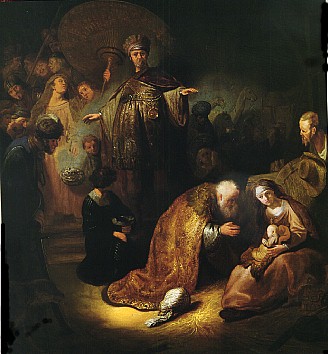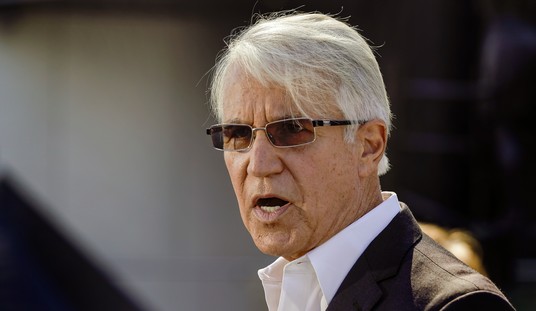From the diaries by Bill S. Great piece of work, heartlander.
Epiphany actually falls on January 6, twelve days after Christmas (that’s why it’s the “Twelfth Day of Christmas”). However, since that falls on Thursday this year, many American churches celebrate Epiphany today.
The word “epiphany” comes from Greek and means “manifestation” or “appearance.” The feast of Epiphany is when we celebrate the “wise men from the East” coming to adore the child Jesus. These were not Jews; they were gentiles, foreigners. This, then, was one of the first manifestations of Jesus’ role as the prophesied “light to the gentiles.” (Luke 2:32)
All four Gospel writers describe occasions when non-Jews recognized Jesus for who He was — even as many of his own people did not. The feast of Epiphany celebrates the remarkable fact that people from a distant, alien culture were among the very first to recognize Jesus’ true identity, the King of Kings.

On Epiphany, as we visualize the wise men adoring Jesus on bended knee, we anticipate the day that will come when every knee shall bend and every tongue shall confess that Jesus is Lord. (Philippians 2:10)
At this point, some people start to get very nervous, because they think that we mean to impose some sort of theocracy, forcing everyone to bow down to Jesus whether they believe in Him or not.
Nothing could be further from the spirit of Christianity, which is not a religion but a freely chosen relationship. You cannot force someone to acknowledge Jesus any more than you can force a person to love another person.
Indeed, the only true theocracies in the world today are Muslim countries, such as Iran and Saudi Arabia. In Islam, religion and government are one and the same thing, and it all hinges on force. Refuse to bend your knee to Allah, and to confess Muhammad as his prophet, and your head will be cut off.
When Christians talk of a day when everyone shall recognize Jesus — a great worldwide Epiphany — we are speaking of a day that only God Himself can bring about. Our job is merely to get out of His way, to not be an obstacle to His revealing Himself to people — as we are when we fail to be good examples of His charity and joy. (Mea culpa!)
None of that is to say that we sit back and do nothing to transform the culture we live in. As a wise man once said, we can’t make people be good, but we can make the kind of society where it is easier for people to choose to be good. As Christians and Jews, we respect the dignity of the human individual, made in the image and likeness of God, and that includes their God-given free will. We labor to make a social order that respects human dignity by fostering (not forcing) good choices.
Many conservatives often quote the Founding Fathers of the United States on the necessity of religion in public life and indeed, for the very survival of this constitutional republic. That does not make them theocrats. John Adams was not being a theocrat when he said, “Our Constitution was made only for a moral and religious people. It is wholly inadequate to the government of any other.”
Patrick Henry — best known for “Give me liberty or give me death!” — was the furthest thing from a theocrat when he observed that a predominantly Christian nation provides the best home for people of every faith and no faith, precisely because individual freedom of choice is at the very core of the Christian view of the human person. Henry wrote: “It cannot be emphasized too clearly and too often that this nation was founded, not by religionists, but by Christians; not on religion, but on the gospel of Jesus Christ. For this very reason, peoples of other faiths have been afforded asylum, prosperity, and freedom of worship here.” [italics mine]

Michael Novak wrote a marvelous article on all of this, “The Faith of the Founding,”in which he pays special attention to the thinking of James Madison.
So high is … God’s valuation of human liberty of conscience that, even though He has launched a divinely commissioned religion in history (in two Covenants, Jewish and Christian), He would not have either of these religions imposed by force on anyone…. Alone among the religions of the world, Judaism and Christianity place so high a valuation upon religious liberty because of their own doctrine that the relation God seeks with humans is friendship.
Cross-posted at West to the West Wing 2012













Join the conversation as a VIP Member